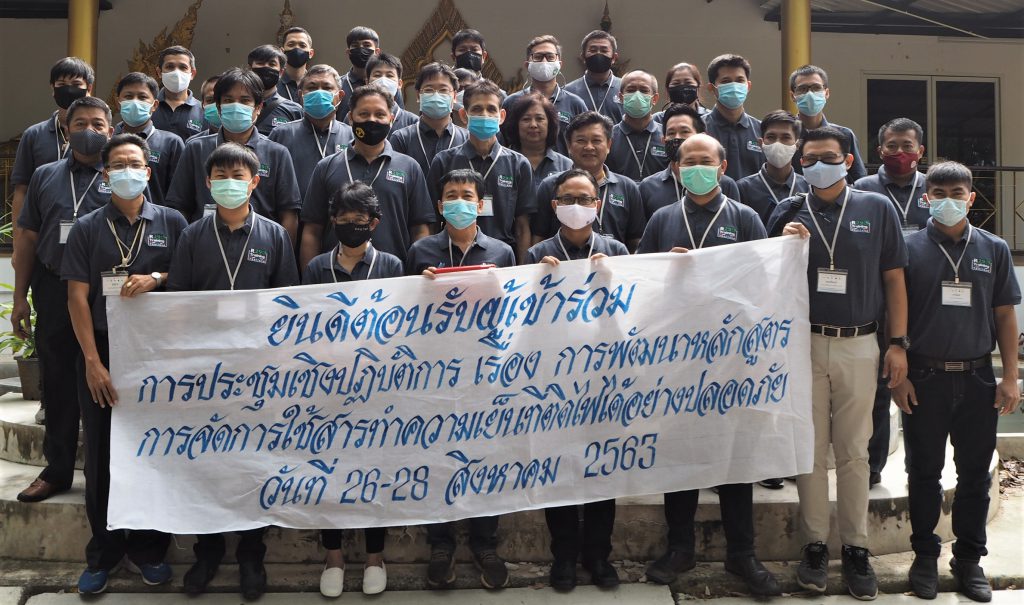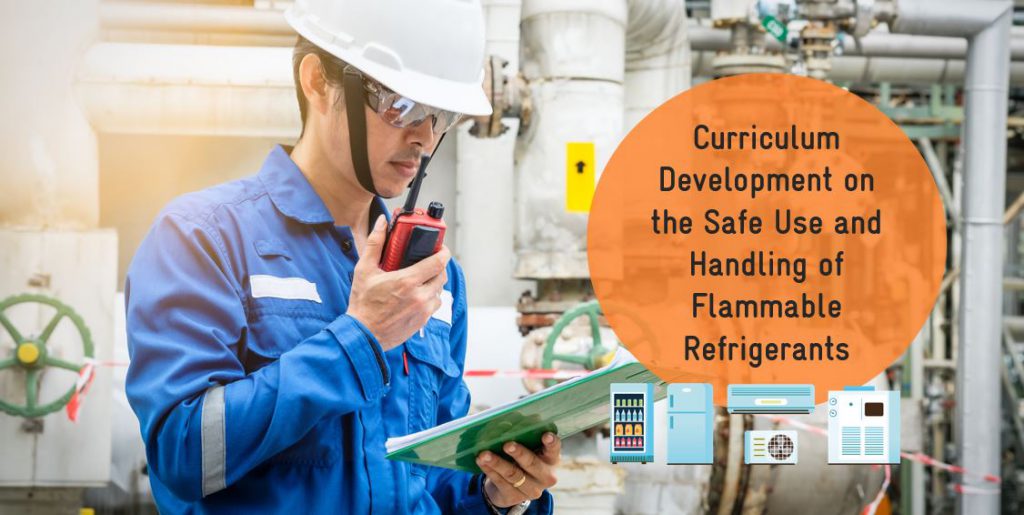Thailand is powering ahead with transforming its refrigeration and air-conditioning (RAC) sector towards the use of natural refrigerant, a climate-friendly and energy-efficient cooling substance. The country is ramping up the training of its service workforce with the development of new curricula to prepare vocational and university students, technicians, teachers and trainers to safely handle these cooling agents.
As more manufacturers of RAC equipment switch their production lines to natural refrigerants, Thailand needs to prepare its servicing sector with knowledge on the safe operation of natural refrigerants. This year, approximately 100,000 cooling products with natural refrigerants (so-called ‘green cooling technologies) are expected to be on the Thai market. The demand for green cooling technologies is projected to grow over the next 3 years when it will make up 50 per cent of market share. This is addressed through the teaching of a national curriculum to ensure long-term competence which is the backbone of this cooling transition.
Trained personnel are key to the transition of new technologies
In August 2019, Thailand’s first training programme on the safe use and handling of flammable refrigerants was launched in collaboration with 3 key organisations: King Mongkut’s University of Technology North Bangkok (KMUTNB), the Electricity Generating Authority of Thailand (EGAT) and GIZ. The modules were a combination of theoretical input and practical exercise and aimed only at the RAC trainers and heads of technicians.
A year later, the piloted training series were concluded with 222 trainers trained and 8 training centres established across the nation. Despite positive feedback, this training is not without challenges of its own. Many expressed the view that the course should be adjusted to better serve the local context, cater to wider target groups and be embedded in the curricula of the Office of the Vocational Education Commission (OVEC) and Department of Skill Development (DSD). Only then will Thailand be able to generate enough RAC technicians to serve the growing demand over the long term.
Rolling out the course designed for the Thai context
From 26 – 28 August, a workshop on “Curriculum Development on the Safe Use and Handling of Flammable Refrigerants” was held in Ratchaburi with more than 35 representatives from KMUTNB, OVEC, DSD, the Thai Refrigeration Association (TRA) and GIZ. The new curricula now under discussion will incorporate lessons-learned from the pilot training-of-trainer course organised earlier, and will be designed to serve the needs of various target groups, i.e. service and industrial technicians, teachers and trainers, vocational and university students, as well as the general public.

Asked about how she envisioned the training, Ms. Ratchawan Thongnuam, an instructor from Lampang Regional Institute for Skill Development, said: “DSD should put a strong focus on training AC technicians, especially those working for a company and freelancers, with an upgrade course on flammable refrigerants. Besides giving the trainees the basic knowledge, DSD can also serve as a testing body and give out certifications.”
A lecturer from Yasothon Technical College, Mr. Permpoon Ananta, shared his vision for OVEC, saying: “A module on the safe use and handling of flammable refrigerants should be integrated with the existing curriculum. It is important that instructors who teach refrigeration and air-conditioning engineering courses ensure their students are equipped with the technical knowledge and practical skills in accordance with the safety protocols. OVEC has a mission to prepare its students at both the vocational certificate and high vocational certificate levels for this industry that is in transition.”
“There are more than 429 educational institutions under the supervision of OVEC and about 10,000 graduates entering the service workforce each year. We need to make sure they have all the knowledge and skills to hand,” he added.
Regarded as the national champions of natural refrigerant, a team of KMUTNB professors have passed on the knowledge gained from international experts to 222 head technicians, chief trainers and skills development instructors. This first batch of trainees is now acting as knowledge multipliers in their respective networks. But what is next for the KMUTNB team now that all the training courses have ended?
Professor Rathaporn Rasami, one of the KMUTNB experts who ran the training, said: “To drive forward the shift to more sustainability, the KMUTNB should also focus on research and development (R&D) as well as training. As an academic institute, we can be a hub for holding seminars and organising training for RAC practitioners, entrepreneurs and the public.”
From F-gases to natural refrigerants
For decades, Thailand has been reliant on such synthetic refrigerants as fluorinated refrigerants or F-gases. The country has only recently begun to discover a greener way of cooling and the enormous potential of natural refrigerants, namely hydrocarbons, for domestic and commercial refrigerators, air-conditioners and chillers.
With its zero-ozone depletion potential (ODP) and very low global warming potential (GWP), R290 is considered the definitive solution to environmental damage and positioned as the alternative for the next generation of refrigerants for room air conditioners. However, its use is hindered by its flammability and the resulting concerns on safety. Studies and testing have confirmed that the application of hydrocarbons is safe if applicable safety standards (for ACs: IEC 60335-2-40 and TIS 1529) are met, and installation and servicing are conducted by trained technicians.
The switchover from one refrigerant to another is nothing new in the RAC sector. What is needed for such a transition is up-to-date knowledge on what such new technologies entail. Human development is thus the key to the sustainability of adopting natural refrigerants.
Ms. Ratchawan Thongnuam, the Lampang Regional Institute for Skill Development instructor who also attended the training of trainers, explained. “Everyone should learn about the new refrigerant. R290 which, though flammable, is safe to use if you know how to handle it properly. It is like any other refrigerant. All you need to know is how to handle it safely.”

